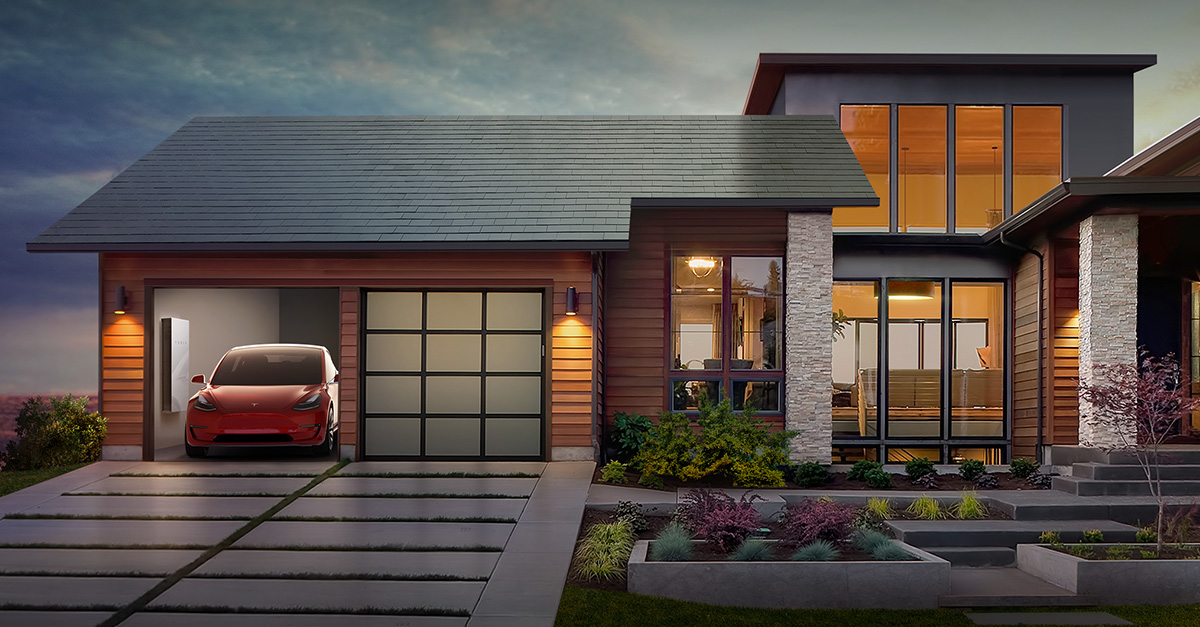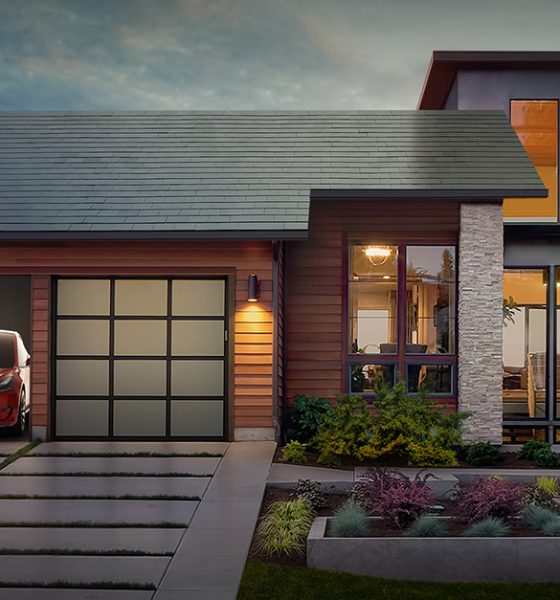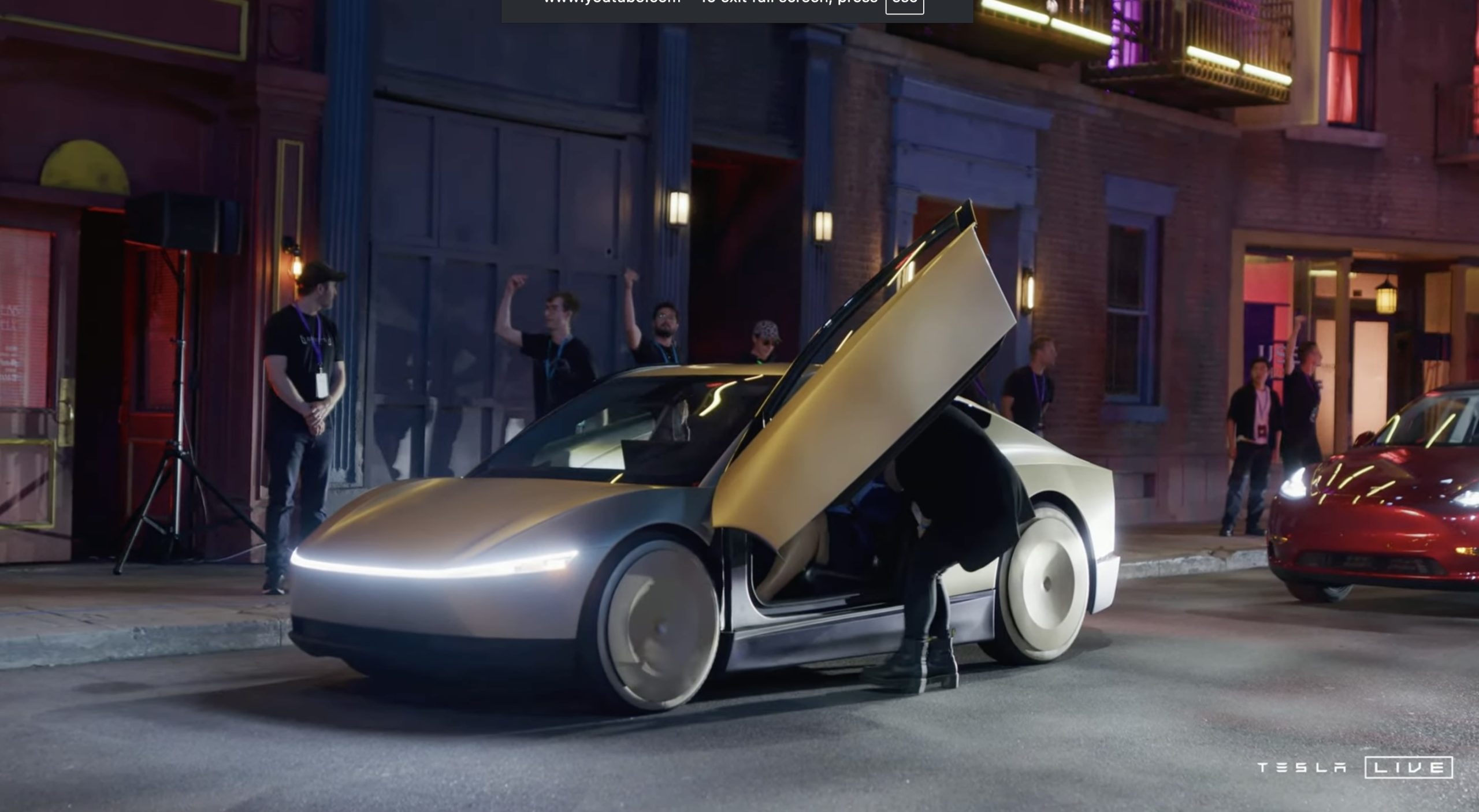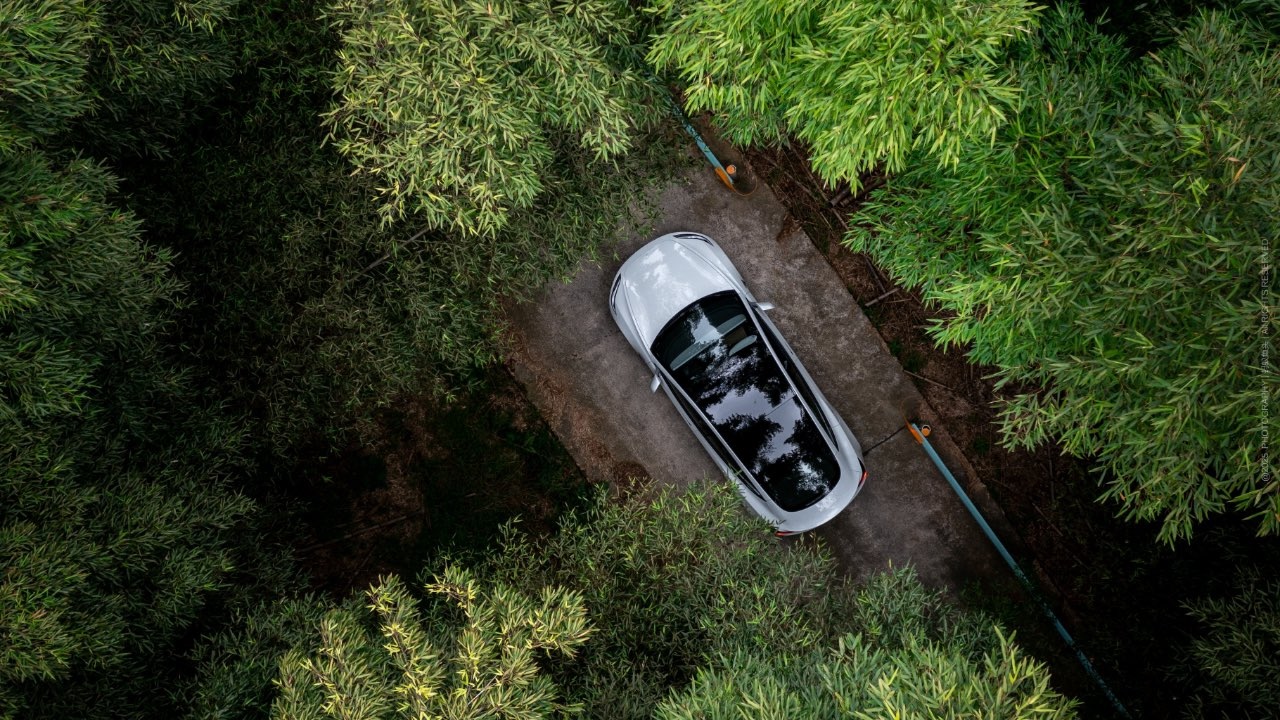

News
Roofing industry keeps close watch on Tesla Solar Roof as production nears
The first installation of Tesla’s highly anticipated Solar Roof product is expected to take place in the coming months, bringing the company one step closer to providing a comprehensive and arguably best looking “sun-to-vehicle” system possible. As we near the inaugural installations, those in the solar industry are keeping a close watch on the impact Tesla’s roll out will have on solar demand and the entire category as a whole.
Tesla’s Solar Roof glass tiles— offered in four styles of Tuscan, Slate, Textured, and Smooth— look like regular roof tiles from ground level, but embedded with photovoltaic solar cells underneath. Tesla claims the glass tiles are more resilient than traditional roof tiles, and the company guarantees them for the lifetime of the house. Sweetening the whole deal, Tesla— with the help of SolarCity, which it merged with in November 2016— includes the labor and materials of tearing down your old roof and installing the new in the purchase of a Solar Roof.
Tesla is not the first to produce solar tiles. In 2016, Dow Chemical stopped its production of solar shingles five years after it first launched them, citing the low efficiency and high costs of their product. Other companies, such as Forward Labs, already produce such a product, but none have the visibility and ability to capture the attention of the media like Tesla and Elon Musk.
Over the past few years, the growth of demand for residential solar installations has begun to slow: consumer preferences have shifted more to community-based systems, electricity prices have plummeted due to falling natural gas and oil prices, and utility companies have begun to push back against catering to those who want to go “off-the-grid.” In an industry with few recent and dramatic product-level innovations, the excitement over residential solar systems has been cooling. According to Forbes, installation growth rates dropped from 63% per year from 2013 to 2015, to merely 16% in 2016. Some believe that Tesla’s high-visibility and loyal consumer base can reinvigorate the market. Grace Robertson, marketing manager of LightWave Solar, a solar installation company not affiliated with Tesla, said that Tesla’s movement has prompted local interest in LightWave Solar and the solar industry as a whole.
“The Solar Roof announcement generated a buzz and we got a few more phone calls than usual,” wrote Robertson in a comment to Teslarati. “It gets people excited about solar.”
But Tesla’s product is not just a replacement for solar panels: it is a replacement for solar panels and the entire roof they sit on. This comes with a hefty price tag. Tesla has advertised that the cost of the solar roof, offset by tax breaks and generation of solar energy, will be competitive with the price of a more traditional roof made with comparable materials. But these “comparable materials”— slate, glass, and terra-cotta— do not include the asphalt shingles that top over 75% of American homes. That focuses the market down to the other 25%.
According to Tesla’s Solar Roof cost calculator, the estimated cost and benefit of a solar roof is highly dependent on one’s location, typical electricity bill, and square footage of your house. For a typical residence in Massachusetts of 2,400 square feet with a $215/mo electric bill, a solar roof in which 60% of tiles are solar panels, would cost $71,600, not including the addition of a Powerwall 2 home battery storage system. Offsetting the cost is the projected $99,300 worth of energy generated by the roof over 30 years in addition to a $20,400 federal tax credit. Over those 30 years, Tesla estimates the home-owner will earn a net $41,100. Not a bad deal, although re-roofing the same house with asphalt shingles would cost only around $11,000 to $17,000. For a similar-sized house in central Iowa, the Tesla calculator recommends a covering of 50% solar tiles for the roof, with an upfront price tag of $40,500 (plus a $7,000 Powerwall 2 battery) for a net cost of $7,100 over 30 years. Not as great a deal.
For some, high property taxes and already low electricity bills make these upfront costs even less attractive. As Senior Technology Editor at Ars Technica Lee Hutchinson pointed out on Twitter: “My 2600sqft **HOUSE** only cost $200k. My property taxes would explode w/adding another 50% onto the home’s appraised value [with a solar roof].”
This is true. The economics are not yet compelling where housing and utility costs are low and property taxes are high.
— Elon Musk (@elonmusk) May 10, 2017
Hutchinson lives in Texas, and expressed the concerns of many who wish they could buy into the solar roofs, but can’t get past the sticker shock. Elon Musk replied that he understood the concern over the high prices, tweeting: “This is true. The economics are not yet compelling where housing and utility costs are low and property taxes are high.”
Robertson, from LightWave Solar, noted that while Tesla’s product is bringing renewed interest to the solar industry, she does not expect the solar roof to significantly impact the sales of more traditional solar panels due to these high upfront costs.
“Since most of our customers want the most cost-effective solar solution, we don’t expect the Solar Roof to put much of a dent in our sales of traditional solar panels,” wrote Robertson.
However, in an op-ed for the San Francisco Tribune, CEO and founder of EnergySage Vikram Aggarwal, an online solar marketplace backed by the U.S. Department of Energy, argued that the buzz around Tesla’s Solar Roof may not be too good for traditional solar installers after all. Aggarwal wrote that before the tiles are installed and tested on real people’s houses, the uncertainty around the roof’s total cost and energy production will cause consumers to delay buying the product until more information is available. In the meantime, those who have become excited about solar energy are not giving business to local solar panel installers either.
“The Tesla Solar Roof should be viewed as a well-designed luxury roofing product first — its solar production benefits are an additional benefit, but not its core offering,” wrote Aggarwal. “Until more comprehensive, transparent information about the all-in costs of the Tesla Solar Roof are made available, his revolutionary product may only take the wind out of the rest of the solar industry’s sails.”
But for those who are already willing to pay for high-end roofing materials and who are looking to re-roof in the near future, the Solar Roof could be a great addition to their house and other Tesla products.
With the high costs and slow roll-out, the Solar Roof isn’t expected to immediately revolutionize the solar industry in the US. Most people probably will not see solar shingles in their neighborhood for several years yet. What it will do is push the solar industry back into the limelight for at least a few months and encourage consumers to reimagine a home powered by the sun in a new era of fashionable renewable energy. Tesla is not the first to bring accessible solar to residential areas, but it is the first in a long time to make it cool.
Elon Musk
Tesla CEO Elon Musk drops massive bomb about Cybercab
“And there is so much to this car that is not obvious on the surface,” Musk said.

Tesla CEO Elon Musk dropped a massive bomb about the Cybercab, which is the company’s fully autonomous ride-hailing vehicle that will enter production later this year.
The Cybercab was unveiled back in October 2024 at the company’s “We, Robot” event in Los Angeles, and is among the major catalysts for the company’s growth in the coming years. It is expected to push Tesla into a major growth phase, especially as the automaker is transitioning into more of an AI and Robotics company than anything else.
The Cybercab will enable completely autonomous ride-hailing for Tesla, and although its other vehicles will also be capable of this technology, the Cybercab is slightly different. It will have no steering wheel or pedals, and will allow two occupants to travel from Point A to Point B with zero responsibilities within the car.
Tesla shares epic 2025 recap video, confirms start of Cybercab production
Details on the Cybercab are pretty face value at this point: we know Tesla is enabling 1-2 passengers to ride in it at a time, and this strategy was based on statistics that show most ride-hailing trips have no more than two occupants. It will also have in-vehicle entertainment options accessible from the center touchscreen.
It will also have wireless charging capabilities, which were displayed at “We, Robot,” and there could be more features that will be highly beneficial to riders, offering a full-fledged autonomous experience.
Musk dropped a big hint that there is much more to the Cybercab than what we know, as a post on X said that “there is so much to this car that is not obvious on the surface.”
And there is so much to this car that is not obvious on the surface
— Elon Musk (@elonmusk) January 2, 2026
As the Cybercab is expected to enter production later this year, Tesla is surely going to include a handful of things they have not yet revealed to the public.
Musk seems to be indicating that some of the features will make it even more groundbreaking, and the idea is to enable a truly autonomous experience from start to finish for riders. Everything from climate control to emergency systems, and more, should be included with the car.
It seems more likely than not that Tesla will make the Cybercab its smartest vehicle so far, as if its current lineup is not already extremely intelligent, user-friendly, and intuitive.
Investor's Corner
Tesla Q4 delivery numbers are better than they initially look: analyst
The Deepwater Asset Management Managing Partner shared his thoughts in a post on his website.

Longtime Tesla analyst and Deepwater Asset Management Managing Partner Gene Munster has shared his insights on Tesla’s Q4 2025 deliveries. As per the analyst, Tesla’s numbers are actually better than they first appear.
Munster shared his thoughts in a post on his website.
Normalized December Deliveries
Munster noted that Tesla delivered 418k vehicles in the fourth quarter of 2025, slightly below Street expectations of 420k but above the whisper number of 415k. Tesla’s reported 16% year-over-year decline, compared to +7% in September, is largely distorted by the timing of the tax credit expiration, which pulled forward demand.
“Taking a step back, we believe September deliveries pulled forward approximately 55k units that would have otherwise occurred in December or March. For simplicity, we assume the entire pull-forward impacted the December quarter. Under this assumption, September growth would have been down ~5% absent the 55k pull-forward, a Deepwater estimate tied to the credit’s expiration.
“For December deliveries to have declined ~5% year over year would imply total deliveries of roughly 470k. Subtracting the 55k units pulled into September results in an implied December delivery figure of approximately 415k. The reported 418k suggests that, when normalizing for the tax credit timing, quarter-over-quarter growth has been consistently down ~5%. Importantly, this ~5% decline represents an improvement from the ~13% declines seen in both the March and June 2025 quarters.“
Tesla’s United States market share
Munster also estimated that Q4 as a whole might very well show a notable improvement in Tesla’s market share in the United States.
“Over the past couple of years, based on data from Cox Automotive, Tesla has been losing U.S. EV market share, declining to just under 50%. Based on data for October and November, Cox estimates that total U.S. EV sales were down approximately 35%, compared to Tesla’s just reported down 16% for the full quarter. For the first two months of the quarter, Cox reported Tesla market share of roughly a 65% share, up from under 50% in the September quarter.
“While this data excludes December, the quarter as a whole is likely to show a material improvement in Tesla’s U.S. EV market share.“
Elon Musk
Tesla analyst breaks down delivery report: ‘A step in the right direction’
“This will be viewed as better than feared deliveries and a step in the right direction for the Tesla story heading into 2026,” Ives wrote.

Tesla analyst Dan Ives of Wedbush released a new note on Friday morning just after the company released production and delivery figures for Q4 and the full year of 2025, stating that the numbers, while slightly underwhelming, are “better than feared” and as “a step in the right direction.”
Tesla reported production of 434,358 and deliveries of 418,227 for the fourth quarter, while 1,654,667 vehicles were produced and 1,636,129 cars were delivered for the full year.
Tesla releases Q4 and FY 2025 vehicle delivery and production report
Interestingly, the company posted its own consensus figures that were compiled from various firms on its website a few days ago, where expectations were set at 1,640,752 cars for the year. Tesla fell about 4,000 units short of that. One of the areas where Tesla excelled was energy deployments, which totaled 46.7 GWh for the year.
🚨 Wedbush’s Dan Ives has released a new note on Tesla $TSLA:
“Tesla announced its FY4Q25 delivery numbers this morning coming in at 418.2k vehicles slightly below the company’s consensus delivery estimate of 422.9k but much better than the whisper numbers of ~410k as the…
— TESLARATI (@Teslarati) January 2, 2026
In terms of vehicle deliveries, Ives writes that Tesla certainly has some things to work through if it wants to return to growth in that aspect, especially with the loss of the $7,500 tax credit in the U.S. and “continuous headwinds” for the company in Europe.
However, Ives also believes that, given the delivery numbers, which were on par with expectations, Tesla is positioned well for a strong 2026, especially with its AI focus, Robotaxi and Cybercab development, and energy:
“This will be viewed as better than feared deliveries and a step in the right direction for the Tesla story heading into 2026. We look forward to hearing more at the company’s 4Q25 call on January 28th. AI Valuation – The Focus Throughout 2026. We believe Tesla could reach a $2 trillion market cap over the coming year and, in a bull case scenario, $3 trillion by the end of 2026…as full-scale volume production begins with the autonomous and robotics roadmap…The company has started to test the all-important Cybercab in Austin over the past few weeks, which is an incremental step towards launching in 2026 with important volume production of Cybercabs starting in April/May, which remains the golden goose in unlocking TSLA’s AI valuation.”
It’s no secret that for the past several years, Tesla’s vehicle delivery numbers have been the main focus of investors and analysts have looked at them as an indicator of company health to a certain extent. The problem with that narrative in 2025 and 2026 is that Tesla is now focusing more on the deployment of Full Self-Driving, its Optimus project, AI development, and Cybercab.
While vehicle deliveries still hold importance, it is more crucial to note that Tesla’s overall environment as a business relies on much more than just how many cars are purchased. That metric, to a certain extent, is fading in importance in the grand scheme of things, but it will never totally disappear.
Ives and Wedbush maintained their $600 price target and an ‘Outperform’ rating on the stock.










